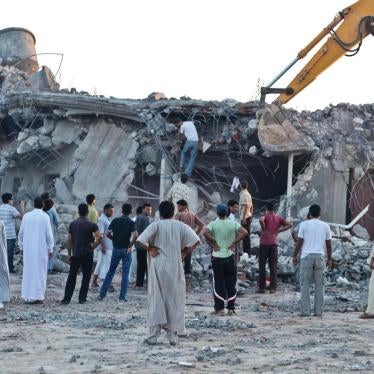The alliance risks accusations of double standards if it does not urgently address the issue of civilians killed in its air strikes.
At least 72 civilians, including 24 children, were killed by Nato air strikes during the alliance's military campaign in Libya last year. Human Rights Watch has issued a report, based on extensive on-the-ground research and multiple visits to bombing sites where civilians died, in which no clear evidence of a legitimate military target was found. Nato and the nations that participated in the air campaign – including the UK government – have refused even to acknowledge these fatalities, to provide specific information on the military target or to conduct a field investigation into the incident. No compensation has been provided to any of the families of the dead and the wounded.
This response would be disappointing in any circumstances; it is particularly indefensible when the stated purpose of the Nato campaign, and the legal authority for the action under UN Security Council Resolution 1973, was to protect civilians. It is true that the overall level of civilian casualties from the air campaign was relatively low compared to other campaigns, reflecting the important steps that Nato took to minimise civilian casualties, including the exclusive use of precision-guided munitions and a generally cautious approach to targeting. But this in no way obviates the need for Nato to investigate the incidents in which civilians died, to understand what happened in these cases and to be transparent about mistakes and violations of the laws of war.
In seven of eight bombing sites Human Rights Watch investigated, we found no clear military target at the time when Nato strikes resulted in civilian fatalities. At the eighth site – at which three women and four children died – the target may have been a Libyan military officer. Overall, we believe that serious questions need to be answered to determine whether Nato forces violated the laws of war with these air strikes (in one, Nato admitted a targeting malfunction).
Under the laws of war, parties to a conflict may only direct attacks at military targets and they must take all feasible steps to minimise harm to civilians. While civilian casualties do not necessarily mean that the laws of war have been violated, governments are obligated to investigate allegations of serious violations. This is what Nato has yet to do satisfactorily, even though it was also a key demand made of it by the International Commission of Inquiry on Libya, set up by the United Nations.
The most serious of the incidents we investigated occurred in the village of Majer, a village 160km east of Tripoli, on 8 August 2011. Nato air strikes on two family compounds there killed 34 civilians, five of them children, and injured at least 30 people more. These compounds were full of civilians, some of them people displaced by the intense fighting under way in the area. Initial strikes killed 16 civilians. A further strike, shortly thereafter, killed an additional 18 civilians who had rushed to the scene to assist the wounded and dying. This last strike used an infrared system that should have indicated to the pilot the presence of many people on the ground. If the pilot had been unable to determine that they were fighters, then the strike should have been cancelled. It is answers to these kind of questions, in Majer and elsewhere, that Nato should be providing.
Nato's claim that it cannot investigate civilian casualties because it has no mandate to be in Libya is feeble and disingenuous. If Human Rights Watch can visit each of the sites – to inspect weapons debris, interview witnesses and examine medical records and deaths certificates, alongside reviewing satellite imagery and photographic evidence – Nato should certainly ask the Libyans for access to the sites to do the same. It has not done so.
Without investigations, Nato is saying it won't provide compensation to the victims of unlawful strikes, as required by the laws of war. Nor has it considered providing compensation for all civilian victims of Nato strikes, as it has done in Afghanistan. Many of the same countries that participated in the Libyan campaign make compensation payments in Afghanistan to families harmed by international military action without any claim of a laws-of-war violation. In a curious piece of logic, Nato's spokeswoman, Oana Lungescu, said this morning that Nato was not obliged to pay compensation to affected Libyans because the international military operation was conducted from the air, without any international troops on the ground. This will be little comfort to the families who lost loved ones in Nato air attacks.
There is an urgent and compelling case for a thorough and impartial investigation into civilian casualties in Libya resulting from Nato air strikes, with the findings reported to the United Nations security council, which authorised the operation. It is very welcome that the issue of protecting civilians in conflict has moved up the political agenda in recent years, in part because of the advocacy of some Nato countries like the UK. But Nato will not carry credibility on these issues, and will rightly be exposed to the charge of double standards, if it fails to provide specific information where there was no evident military target, does not properly investigate civilian deaths, and denies compensation to the victims of unlawful attacks.








